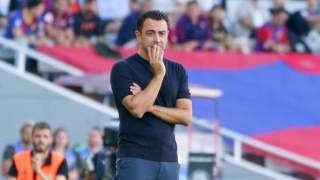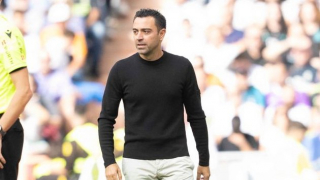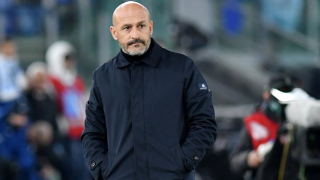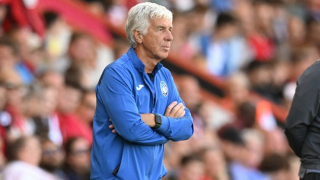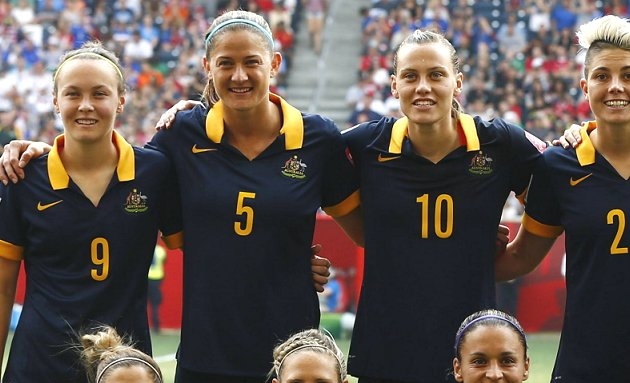This week we review the 2018 Copa America Femenina in Chile, which also decides the 2019 Women's World Cup qualifiers for South America. We also review the Asian Cup Finals Tournament, again which doubles as Women's World Cup qualifiers.
Copa America Femenina/South American World Cup Qualifiers
This week we review the 2018 Copa America Femenina, which was held in Chile from April 4-22 and doubled as the 2019 Women's World Cup CONMEBOL qualifiers, with the top two teams advancing directly, while the third place side has one last chance to go to France next summer with a two-leg playoff later this year with the fourth place side from CONCACAF, which will hold their continental championships this October. Brazil and Chile advanced directly while Argentina made it to the continental play-in match with a CONCACAF team to be decided this fall. Colombia failed to advance to France, falling after two consecutive World Cup spots in 2011 and 2015.
In two five team first round groups, in Group A, Colombia (10 points) and hosts Chile (8 points) advanced to the semifinals over Paraguay, Peru and Uruguay. Chile tied with Paraguay 1-1 and alsoColombia by the same score, the latter game being the key since, in what seemed to shape up early as the Group A decider, Colombia blasted Paraguay in each side's third match of the Group, 5-1, with all the scoring coming from Colombian league players: Catalina Usme (America de Cali) tallied three consecutive goals within 25 minutes either side of half time, while Diana Ospina (Deportivo Formas Intimas) and Leicy Santos (Independiente Santa Fe) scored the other goals. Diama Cortaza (Sportivo Limpeno of Paraguay) scored a late goal for Paraguay.
Chile pipped Paraguay by one point (8-7 in the group table), which was a bit of a surprise as the landlocked country had been improving on the club and youth national team side of late. Uruguay and Peru each finished with just one point, after a 1-1 tie in their second group game.
Group B saw Brazil waltz to a 4-0 record, with 22 goals and 1 against—which was surrendered against Argentina in a 3-1 win—while Argentina (9 points) finished second, and promising Venezuela third (6 points), with Bolivia (3 points) and Ecuador (0 points) lagging behind. Venezuela lost to Brazil 4-0 and crucially to Argentina 2-0 in essentially the Group B semifinal berth decider. Venezuela, such a power at the youth level with 2014 and 2016 FIFA U-17 World Cup fourth place finishes and making their first U-20 FIFA Finals in Papua New Guinea in 2016, has failed to qualify for a senior Women's World Cup for the seventh time (they did not attempt to qualify for the 1995 event in Sweden).
In the final group stage with the four semifinalists, Brazil and Argentina both began brightly with 3-1 wins over Chile and Colombia respectively on April 16. Three days later, Brazil overcame Argentina 3-0 to qualify for their eighth consecutive World Cp. The 2007 runners-up were led by second half goals by four-time WWC Finals participant Cristiane (Changchun Zhuoyou FC) and NWSL duo Thaisa (Sky Blue FC) and Debinha (North Carolina Courage). Chile and Colombia played to a 0-0 tie with left both teams with a chance to finish above Argentina for second and the automatic qualifying spot from the region. On April 22, Chile played Argentina off the park for a 4-0 win in front of a large and appreciative home crowd, while Brazil (9 points) used two goals by Monica (Orlando Pride) and one by Formiga (Paris St. Germain) to defeat Colombia 3-0, to leave Colombia at the bottom of the final group with 1 point; they will miss the Women's World Cup in 2019 after appearing in 2011 in the Group Stage and making the Round of 16 in 2015. Chile finished with 4 points to 3 for Argentina. Chile has qualified for the Women's World Cup for the first time in their history.
The Copa America Femenina also doubles as qualifying for the 2020 Olympic women's soccer tournament—the winner qualifies automatically and the second-place team plays off against an African opponent—and 2019 Pan-American Games women's soccer tournament.
Maria Usme led the tournament with nine goals, followed by Beatriz of Brazil with 6 and Venezuela's Denya Castellanos and Soledad Jaimes of Argentina both with 5.
A look at the rosters of the ten teams is interesting, with some countries heavily reliant on players from abroad—including other CONMEBOL countries as well as Europe, America and Asia—while others have only a few imports and Bolivia is entirely composed of domestic-based players. Brazil, one would think would lead the way with imports as is typical in major tournaments, but not this year as surprisingly Venezuela has only one player from their home league, compared with Brazil's five; all the others are imports (See more below).
First Round Group A Sides
The hosts Chile had three players recalled from European clubs:
Christiane Endler--PSG (France)
Camila Saez—CD Tacon (Spain)
Francisca Lara—Sporting Club de Huelva (Spain)
Three others are based in Brazil and Yanara Aedo is with the Washington Spirit (USA).
In Colombia, a league that arguably is the best in South America or at least even with Brazil, has only one player abroad in Isabella Echeverri of the University of Toledo/Houston Aces of the UWS summer league in the States. Daniela Caracas has no current side.
Stars from Colombia's past World Cup teams are now at home, including:
Lady Andrade—Atletico Nacional (Colombia), who has played professionally in Spain, the U.S., Finland and Turkey
Yoreli Rincon—Atletico Huila (Colombia), who played professionally in Brazil, the U.S., Sweden, Italy and Norway
Paraguay had three squad members in Chile who played outside the country but within South America:
Veronica Rivero—Foz Cateratas (Brazil)—across the border from Ciudad de Este in the eastern part of the country
Jessica Martine—Santos (Brazil)
Gloria Vallamayor—Patriotas FC (Colombia)
Peru's lone two imports are collegians in the U.S.
Claudia Cagnina—St John's University Red Storm (USA)
Julia Suarez—Virginia Commonwealth University Rams (USA)
Uruguay has two Copa America team members based in Spain and two in Argentina:
Pamela Gonzalez—Malaga FC (Spain)
Yamilla Badell—CD Tacon (Spain)
Carolina Birizamberri—River Plate (Argentina)
Sindy Ramirez—San Lorenzo de Almagro (Argentina)
First Round Group B Sides
Argentina has brought in Estefania Banini from the Washington Spirit in the NWSL, and potent goalscorer Soledad Jaimes—who we featured last year when she played in Brazil and is now with Dalian Quanjian in China. Three others based in Spain, two in Colombia and one in Brazil:
Yael Oviedo—Granada CF (Spain)
Yamila Rodriguez—Santa Teresa Badajoz (Spain)
Mariela Coronel—Granada (Spain)
Agustina Barroso—Ferroviaria (Brazil)
Vanesa Santana--America De Cali (Colombia)
Aldana Cometti—Atletico Huila (Colombia)
Bolivia utilized an entirely home based side.
Brazil had a number of players abroad including 7 from America (6 from the NWSL and one in college in the U.S.) They also had 6 from European clubs—two from France and one from each of Denmark, Iceland, Norway and Spain. Four come from Asia, with two based in China and two in the Korea Republic. The remaining 5 play at home in Brazil:
Bárbara—Kindermann (Brazil)
Aline—Unattached with a Brazilian Confederation contract
Letícia Izidoro—Corinthians (Brazil)
Rilany—Grindavik (Iceland)
Poliana—Orlando Pride (USA)
Tamires—Fortuna Hjorring (Denmark)
Mônica—Orlando Pride (USA)
Rafaelle—Changchun Zhuoyue FC (China)
Erika—Paris Saint-Germain (France)
Daiane—Avaldsnes (Norway)
Andressinha—Portland Thorns FC (USA)
Formiga—Paris Saint-Germain (France)
Andressa Alves—Barcelona (Spain)
Thaisa—Sky Blue (USA)
Aline Milene—Baylor University (USA)
Millene Karine—Corinthians (Brazil)
Raquel – Ferroviária (Brazil)
Thaís—Hyundai Steel Red Angels WFC (Korea Republic)
Bia Zaneratto—Hyundai Steel Red Angels WFC (Korea Republic)
Marta—Orlando Pride (USA)
Cristiane—Changchun Zhuoyue FC (China)
Débinha—North Carolina Courage (USA)
Three of the Ecuador squad play in Colombia: goalkeeper Irene Tobar at Real Cartagena and two with Patriotas FC—Ligia Moreira and Mayra Olvera.
As mentioned above, it seems that Brazil—with 18 squad members playing with clubs outside the country—would lead all the other nations but Venezuela exceeds this with 22 from abroad and only one home-based player: Maikerlin Austdillo of Estudiantes de Guarico. Granted, the driver for this exodus has been Venezuela's economic and political turmoil and 15 of the squad play in neighboring Colombia, which has a strong league. Two play in Brazil, two in Spain and one each in France and in the American College system (Denya Castellaneos at Florida State—the U-17 Women's World Cup star). The full squad is:
Andrea Tovar—Alianza Petrolera (Colombia)
Lisbeth Castro Audax—Corinthians (Brazil)
Maleike Pacheco—Cortulua (Colombia)
Nairelis Gutierrez—Union Magadalena (Colombia)
Nubiluz Rangel—Atletico Nacional (Colombia)
Lisol Castillo—Union Magadalena (Colombia)
Jaylis Oliveros—Atletico Huila (Colombia)
Petra Cabrera—La Equidad (Colombia)
Alexyar Canas—CD Santa Teresa (Spain)
Idalys Perez—Cortulua (Colombia)
Marialba Zambrano—Cortula (Colombia)
Cinthia Zarabia—Junior de Barranquilla (Colombia)
Paola Villamizar—Audax-Corinthians (Brazil)
Lisbeth Bandres—Alianza Petrolera (Colombia)
Neily Carrasquel—Junior de Barranquilla (Colombia)
Yenifer Gimenez—Aurillac Arpajon (France Division 2)
Oriana Altuve—Independiente Santa Fe (Colombia)
Denya Castellanos—Florida State University (USA)
Joemar Guarecuco—Cortulua (Colombia)
Gabriela Garcia—Deportivo La Coruna (Spain)
Ysaura Viso—Union Magadalena (Colombia)
Asian Cup Finals Review
In the 2018 AFC Women's Asian Cup, China and Thailand finished first and second in Group A and qualified directly for France 2019, as did Australia and Japan from Group B. The fifth place playoff was an eliminator for the last AFC WWC berth with South Korea blasting the Philippines 5-0. Cho So-hyun (Alvadsnes of Norway) scored twice, the second from a penalty kick, while Jeon Ga-Eul (Melbourne Victory) had two assists. The result is that the AFC representatives at next summer's Women's World Cup will be exactly the same as at the 2015 event, the first time the finals had expanded from 16 teams to 24.
The big surprise was Jordan's last place finish in Group A, when some thought (including this writer) that they would advance easily in second place. They had a 1-0 lead in their first game with the Philippines but lost 2-1, with the winner coming late from Loyola-Marymount (Los Angeles) forward Sarina Bolden. Their second game was crucial with Thailand, and Jordan succumbed by a 6-1 scoreline. Thailand's lone import, Suchawadee Nildhamrong of the University of California Berkeley, scored twice—her first coming in the first minute of the game—and by the 6th minute Thailand had doubled the lead through Taneekarn Danga (Chonburi Sports School). Kanjana Sungngoen (Chonburi Sports School) scored once and had two assists. Shahnaz Jebreen (Amman Club) scored towards the end of the first half to leave Jordan down 4-1, but it was too little too late. Thailand, who defeated the Philippines in their final group match 3-1 to clinch second place, will hopefully build from their WWC debut in 2015, when they finished third in their group, defeating the Ivory Coast 3-2 but falling by 4-0 scorelines to Germany and Norway. Jordan, which lost its final game to China 8-1, should continue to invest in women's football and hopefully will then advance to the WWC for the 2023 event, which would be such a positive for the women's game in the region. More players plying their trade abroad, particularly in Europe, America or East Asia, would also help the side continue to improve. For a future critical tournament such as the Asian Cup, rather than choosing an unknown as head coach—American Mike Dickey, who was drafted in a year ago with this tournament in mind—the Jordan FA may want to invest in a well-known international coach, preferably someone who has participated in a European or FIFA Finals at the national team level.
In the semifinals on April 18, Australia defeated Thailand on penalties (3-1) after a 2-2 tie, which looked much different from the game in which Australia defeated Thailand 5-0 in Perth just before the Asian Cup began. Australia had to rely on a 91st minute Alanna Kennedy (Orlando Pride) header from a corner kick for the tying goal to salvage a 2-2 draw and extra-time, before three Mackenzie Arnold's (Arna Bjornar/Brisbane Roar) saves proved vital in the penalty shootout. Arnold (24), who has just moved to Norway to play professionally, had made a number of mistakes in regulation time, surrendering the first goal to the impressive Kanjana Sung-Ngoen (Chonburi Sports School) by being chipped after a breakaway and then not controlling the ball when backpedaling on the goal line. The second goal came when Arnold's clearance didn't make it out of her own penalty box and Thongsombutt Rattikan (BG-CAS) buried the ball into the net to give her country the lead before the late heroics from Kennedy. Australia had taken the lead in the 17th minute when defender Kanchanaporn Saenkhun (BG-CAS) headed into her goal from an Emily Gielnik (Brisbane Roar) cross. Australia dominated possession but Thailand proved an explosive threat on the counter attack. Thailand almost scored again in in the 41st minute when Kanjana rounded Arnold and saw her shot blocked by Laura Alleway (Melbourne Victory), with Ellie Carpenter (Canberra United/Portland Thorns in 2018) denying Taneekarn Danga (Chonburi Sports School) from the rebound. Kanjara was a handful for the Matilda defence all game, with her speed and breakaway attempts, including another attempt in the 68th minute and again in the 107th minute, that both were scrambled away.
Australian forward Sam Kerr (Chicago Red Stars) said after the game: "It wasn't our best match, but we got the win and we're going to the final, and that's what we came here for. [There were] not really many positives from the game, other than that we won it, and we're through, so that's the main thing." Just a few minutes before Kennedy's lifeline goal, Wilaiporn Boothduang (Royal Thai Airforce) was sent off in the 87th minute after receiving her second yellow card. In a gripping shootout, Emily van Egmond's (Newcastle Jets/Orlando Pride in 2018) miss gave the Thais the early advantage, before Arnold made three consecutive saves, allowing Kerr to end the game on her penalty kick attempt.
Japan beat China 3-1 in the other semifinal with Mana Iwabuchi (INAC Kobe Leonessa) scoring in the 39th minute, while three goals came in the last five minutes of the match—a brace from Kumi Yokoyama (1FFC Frankfurt) and Li Ying's (Shandong Women's FC) single goal—to bring about an Australia-Japan super-powered final.
In a repeat of the Asian Cup Final of two years ago, Japan won 1-0 over Australia in Amman to defend their confederation title with another Yokoyama goal, who entered the match in the 72nd minute and scored 12 minutes later. Elise Kellond-Knight (who has signed with Hammarby of Sweden in 2018, after time in Germany, Japan, Denmark and at home with the Brisbane Roar) saw her penalty saved by Ayaka Yamashita (NTV Beleza) in the 14th minute which would have given the Aussie's an early lead. China beat Thailand 3-1 in the third place match.
Tim Grainey is a contributor to Tribal Football. His latest book Beyond Bend it Like Beckham on the global game of women's football. Get your copy today.
Follow Tim on Twitter: @TimGrainey





